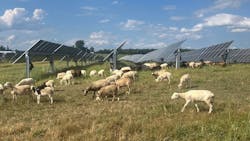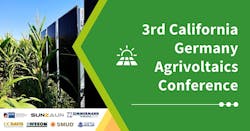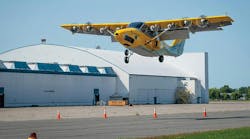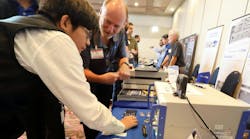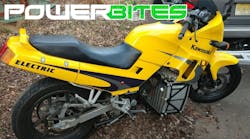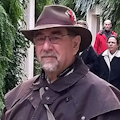Agrivoltaics Conference: Producing Green Power on Active Farmland
What you’ll learn:
- With farmland under increasing economic pressure and energy costs on the rise, agrivoltaics is a proven strategy for producing clean energy while boosting land-use efficiency.
- Technical experts and working farmers from Germany and California will show how this dual-use approach can unlock new revenue streams, increase crop resilience, and advance a more sustainable agricultural economy.
- The one-day program includes technical presentations, poster sessions, and a visit to a working agrivoltaic facility.
Registration is now open for the 3rd California-Germany Agrivoltaics Conference, held November 5th, in Davis, Calif. from 8:30 AM to 6 PM PST. It will spotlight real-world agrivoltaics projects and case studies of projects which have successfully integrated solar power production with highly productive farming operations. Experts from Germany and California will offer attendees a hands-on look at the sector’s practical impact and potential.
Now in its third year, this event will foster knowledge exchange, bring together key stakeholders, and drive collaborations that position agrivoltaics as a cornerstone of sustainable farming in the future.
Exploring Agrivoltaics as the Cornerstone of Future Farming
With farmland under increasing pressure and energy costs on the rise, agrivoltaics offers a powerful solution — generating clean energy while boosting land-use efficiency by up to 70%. Attendees at the Agrivoltaics Conference will discover how this dual-use approach can unlock new revenue streams, increase crop resilience, and advance a more sustainable agricultural economy.
Attendees will also learn how these practices will play a key role in meeting ambitious climate and energy targets set by regions like Germany and California.
As with the alliance’s previous events, Agrivoltaics 2025 aims to explore important issues related to advancing the rapidly growing agrivoltaics market and solidifying agrivoltaics as a sustainable farming solution for the future. These topics include:
- How can agrivoltaic systems be optimally designed to maximize both solar energy production and agricultural yield?
- What are best practices from real-life projects and sustainable business models that deliver value to all agrivoltaics stakeholder groups?
- How can agrivoltaic installations be integrated into smart grids or microgrids to enhance energy efficiency and stability?
Participants will also have the opportunity to enhance their experience with a field trip, where they will get to see first-hand examples of agrivoltaics in action.
Another one of the conference’s highlights will be an on-site Poster Session, providing a platform for professionals, researchers, students, etc. to exhibit their work related to this topic. If you have an innovative idea that deserves global attention, we invite you to submit your work for consideration. Click here to make your submission.
About the Conference
The California Germany Agrivoltaics Conference was created to strengthen transatlantic collaboration in this important sector, promote idea exchanges, and create an ecosystem from which all players involved can benefit. The goal is to build strong German-American partnerships that will lead this growing market of agrivoltaics.
This conference is a joint initiative of the co-organizers Representative of German Business (GACC West), UC Davis, and Sunzaun, supported by the German Federal Ministry of Economics and Climate Protection.
Next in This Edition of PowerBites
More PowerBites
About the Author
Lee Goldberg
Contributing Editor
Lee Goldberg is a self-identified “Recovering Engineer,” Maker/Hacker, Green-Tech Maven, Aviator, Gadfly, and Geek Dad. He spent the first 18 years of his career helping design microprocessors, embedded systems, renewable energy applications, and the occasional interplanetary spacecraft. After trading his ‘scope and soldering iron for a keyboard and a second career as a tech journalist, he’s spent the next two decades at several print and online engineering publications.
Lee’s current focus is power electronics, especially the technologies involved with energy efficiency, energy management, and renewable energy. This dovetails with his coverage of sustainable technologies and various environmental and social issues within the engineering community that he began in 1996. Lee also covers 3D printers, open-source hardware, and other Maker/Hacker technologies.
Lee holds a BSEE in Electrical Engineering from Thomas Edison College, and participated in a colloquium on technology, society, and the environment at Goddard College’s Institute for Social Ecology. His book, “Green Electronics/Green Bottom Line - A Commonsense Guide To Environmentally Responsible Engineering and Management,” was published by Newnes Press.
Lee, his wife Catherine, and his daughter Anwyn currently reside in the outskirts of Princeton N.J., where they masquerade as a typical suburban family.
Lee also writes the regular PowerBites series.
